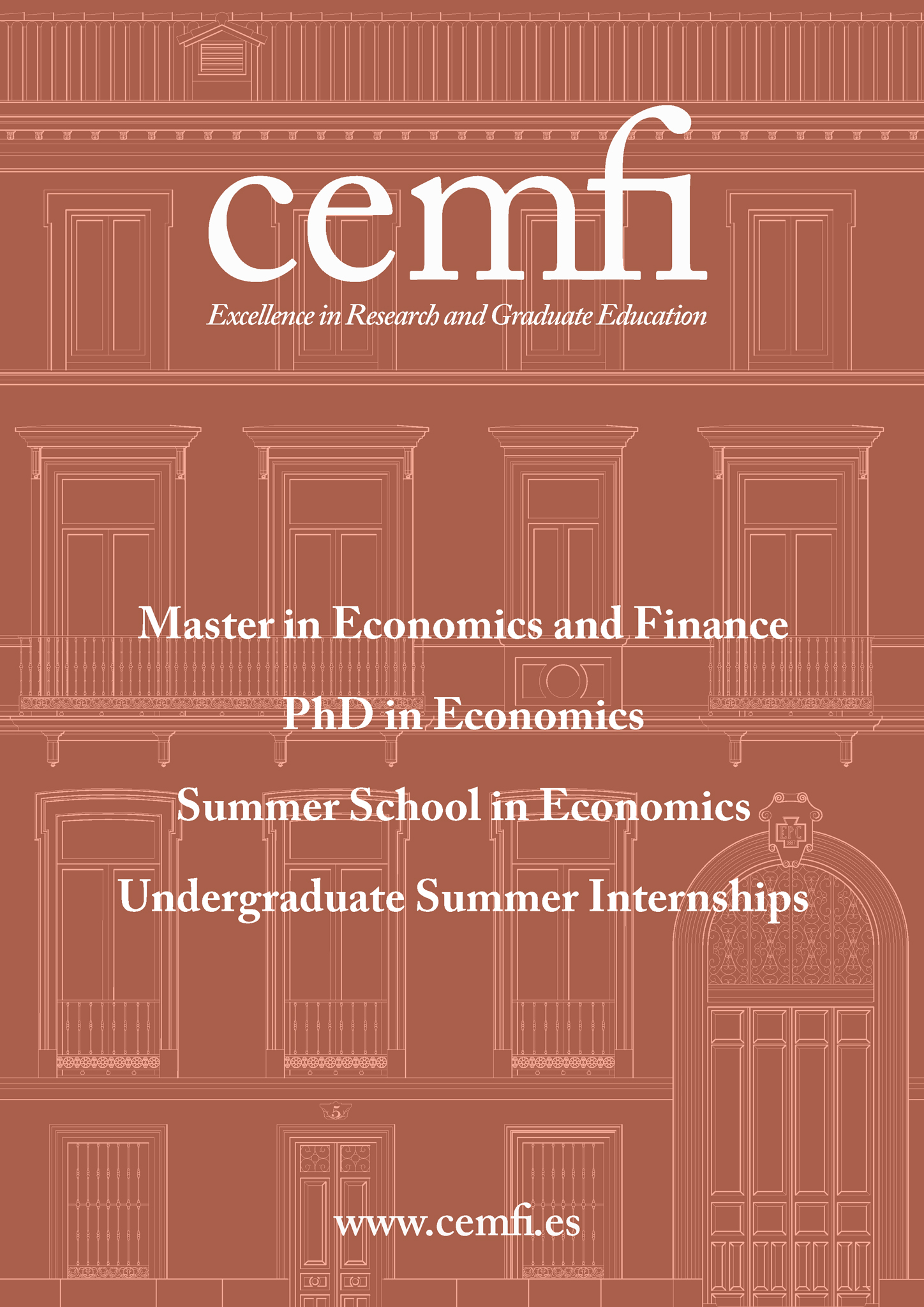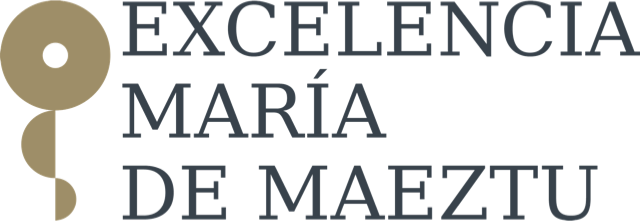Doctoral Program
Program
Coursework Stage
Years 1 and 2 constitute the coursework stage. This is structured around coursework, participation in workshops, and the writing of a short thesis.
Courses. The academic year starts with an intensive math course taught in September. This is followed in the fall and winter terms by core courses in microeconomics, macroeconomics, and econometrics. In the spring term, and during the fall and winter terms of the second year, students take elective courses, acquiring frontier knowledge in their chosen fields of specialization. For details on this year's course offerings, you may visit here.
Workshops. The coursework is complemented with a series of workshops that are designed to aid students learn how to read and discuss research-oriented and policy-oriented papers in applied economics while aquiring presentation skills.
Master Thesis. During the spring term of the second year, students write a research paper (officially, the Master thesis) on their field of interest under the supervision of a faculty member. This paper constitutes the first step towards the PhD dissertation.
In the summer of the first year, students may enroll in CEMFI's research internship program. This program covers a wide range of interests and fields in Economics.
Our official calendar for the academic year 2025-2026 is:
| Math Camp (1st year only) | Winter Term | ||||||
| Lectures begin | 1 September 2025 | Lectures begin | 7 January 2026 | ||||
| Lectures end | 19 September 2025 | Lectures end | 17 March 2026 | ||||
| Exams | 22 September 2025 | Exams | 23 March – 1 April 2026 | ||||
| Fall Term | Spring Term | ||||||
| Lectures begin (1st year) | 22 September 2025 | Lectures begin | 8 April 2026 | ||||
| (2nd year) | 15 September 2025 | Lectures end | 16 June 2026 | ||||
| Lectures end | 28 November 2025 | Exams | 22 – 30 June 2026 | ||||
| Exams | 9 – 19 December 2025 | ||||||
Our official calendar for the academic year 2026-2027 is:
| Math Camp (1st year only) | Winter Term | ||||||
| Lectures begin | 1 September 2026 | Lectures begin | 7 January 2027 | ||||
| Lectures end | 21 September 2026 | Lectures end | 17 March 2027 | ||||
| Exams | 22 September 2026 | Exams | 23 March – 2 April 2027 | ||||
| Fall Term | Spring Term | ||||||
| Lectures begin (1st year) | 23 September 2026 | Lectures begin | 7 April 2027 | ||||
| (2nd year) | 16 September 2026 | Lectures end | 15 June 2027 | ||||
| Lectures end | 1 December 2026 | Exams | 23– 30 June 2027 | ||||
| Exams | 10– 18 December 2026 | ||||||
Research Stage
Subject to meeting program requirements, students may progress to the research stage. Under the supervision of CEMFI faculty, research-stage students work on their doctoral dissertations, making original and innovative contributions to the field of economics. The research stage is designed to support students in their transition to becoming independent researchers.
Research students are an integral part of the CEMFI research community and actively participate in seminars, workshops, summer school courses, and conferences. The program also offers activities specifically designed to develop research skills and foster an environment conducive to identifying and refining research topics, including a dedicated PhD workshop and a series of short courses.
PhD workshops. Students present their work before faculty and fellows students several times per year. This allows students to receive continuous feedback on their research while developing effective presentation skills. There are a total of five PhD workshops, in the areas of applied economics, banking and finance, econometrics, macroeconomics, and microeconomics.
Short courses. These are short (tipically, one week) courses that are specifically designed for students in the research stage. These specialized courses are taught by leading international scholars in the field.
We encourage PhD students to present their work at major international conferences as well as at specialized workshops with significant relevance to the student's field of study. With this aim, CEMFI has a financial support program the covers the student's registration, travel, and accommodation expenses.
We encourage PhD students to be part of the international network of economists and interact with leading experts in their field. With this aim, CEMFI has a financial support program that covers the student's expenses while visiting other institutions during the research stage of their PhD. Our PhD students have visited many renowned institutions, including Carnegie Mellon University, University of Chicago, Harvard University, London Business School, London School of Economics, University of Minnesota, MIT, Northwestern University, University of Pennsylvania, Stanford University, University College London, and University of Wisconsin-Madison.
PhD students can obtain additional funding that will help launch their research projects through both internal and external sources. The typical activities covered by such grants are obtaining data sets, running lab or field experiments, and improving computational capabilities. Given the growing importance of applied research in economics, at CEMFI we regard providing students with sufficient resources to obtain and process data as a critical input for their success.
General Graduate Program Information
Students who successfully complete the two stages of the program will be awarded the degrees:
Master in Economics and Finance (after successfully completing the first two years) Awarded by Universidad Internacional Menéndez Pelayo (UIMP) Official degree 120 ECTS
PhD in Economics and Government (after successfully defending the PhD dissertation) Awarded by Universidad Internacional Menéndez Pelayo (UIMP) Official degree
Coursework stage (Master in Economics and Finance - years 1 and 2)* |
||
Tuition fees |
National and EHEA students: EUR 3,300/yr |
|
Administrative fees* |
EUR 40.58 (yr 1)/EUR 7.78 (yr 2) |
|
Research stage (PhD in Economics and Finance - year 3, onwards)* |
||
Administrative fees* |
EUR 230.78/yr |
|
*Subject to minor adjustments.
We offer academic-merit based scholarships and tuition waivers to students of all nationalities. To be considered for funding, please select the appropriate checkbox in the application form. Please note that this selection will not affect your chances of being admitted.
Applicants to the CEMFI Graduate Program may also consider applying for external funding. Institutions awarding scholarships, include Banco de España, Fundación Rafael del Pino, the Government of the Basque Country, Spanish Ministry of Education and the Spanish Ministry of Foreign Affairs. For Latin American students, the Fundación Carolina, in cooperation with BBVA, endows one scholarship that includes a stipend of EUR 900 per month, for a total of 22 months, a round trip economy-class ticket from the student's country of residence, medical insurance (excluding prescriptions), and the program’s tuition fees. For Turkish students, the BBVA funds one scholarship that includes a stipend of EUR 1,250 per month for a total of 22 months, and the program's tuition fees.
Academic honesty. CEMFI is committed to the highest possible standards of academic honesty. Academic dishonesty includes, but is not limited to, cheating, plagiarism, and misrepresentation of a student's academic records or academic work. If academic dishonesty does take place, the student involved will receive an academic sanction that can entail the separation from the Program.
Disabilities. CEMFI is committed to providing accessible services, programs, and educational opportunities to all students. Students with qualifying disabilities may contact the director of the program who will guarantee that the policy procedures are implemented.
Diversity. Cemfi recognizes the positive value of diversity and particularly encourages applications from women and candidates with underrepresented demographics regarding disability, gender identity, race, religion, sexual orientation, socioeconomic background, or other characteristics.
Code of conduct. CEMFI has a Code of conduct for all members of its community. Students should be familiar with its contents and abide by them. It can be found here.
Class attendance. While enrolled in the coursework stage (formally, the Master in Economics and Finance), class attendance is mandatory. This includes class lectures and recitations.
Time limitation. The time limit for completion of the PhD degree is three years since the first enrolment at the PhD level (research stage enrolment). If this time elapses, the student may request a maximum of two one-year extensions from the Academic Commission of the PhD Program.
In April 2017, CEMFI was awarded the María de Maeztu Unit of Excellence Distinction for the years 2017-2020. This highly selective distinction is awarded by Spain’s National Research Agency to “fund and accredit public research centers and units in any scientific area that demonstrate international scientific impact and leadership and actively collaborate with their social and business environment.” The award will provide 2 million euros in funding in 2017-2020 plus an additional PhD scholarships to build on the research initiatives that have established CEMFI as a leading graduate school in the field of economics and, in particular, to expand and strengthen the PhD program.
As part of our commitment to high-quality academic standards, CEMFI has an Internal Quality Guarantee System (IQGS) that continuously assesses the quality of our graduate program. Below you can access the 2015-2016 quality assessment report as well as other related documentation.
- Latest annual report on quality of the Master Program
- IQGS description
- Information on quality assessment at UIMP (Coursework Stage)
- Information on quality assessment at UIMP (Research Stage)
- Verification Report of the Master Program for the National Agency for Quality Assessment and Accreditation (ANECA) (in Spanish)
- Positive Verification of the Master Program by ANECA (in Spanish)
- Verification Report of the PhD Program for ANECA (in Spanish)
- Positive Verification of the PhD Program by ANECA (in Spanish)
- Modification of the Curriculum Report by ANECA (in Spanish)
- Follow-up Report of the Master Program by ANECA (in Spanish)
- Follow-up Report of the PhD Program by ANECA (in Spanish)
- Publication in the Official State Gazette (BOE) (in Spanish)
- Positive Accreditation of the Master Program by ANECA (in Spanish)
- María de Maeztu Fellowship Rules and Regulations
- María de Maeztu Excellence Fellowships Rules and Regulations

